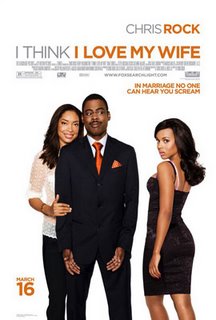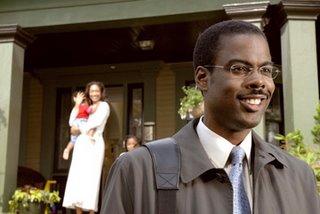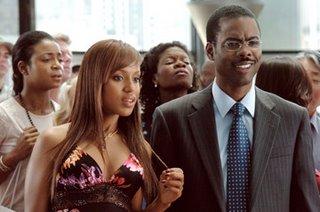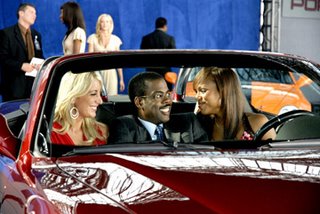
As an actor, Chris Rock has a natural screen presence, and I usually find him very likeable. This aspect is on display in
I Think I Love My Wife, his new romantic comedy drama which is a loose remake of a film unseen by me called
Chloe in the Afternoon. As a filmmaker, Chris Rock still has quite a ways to go. This aspect, unfortunately, is also on display in the very same film. This is Rock's second directorial effort since 2003's
Head of State, and it seems that he has not learned much during that four year time period. He does not work with a sure hand, and often seems confused as to what kind of movie he wants to make. Though entertaining for the most part,
I Think I Love My Wife suffers somewhat because the person at the helm doesn't seem to believe in his own material.

Rock portrays Richard Cooper, a successful New York investment banker who is married to a lovely school teacher named Brenda (Gina Torres), with whom he has two young children. Though Richard would seem to have found marital bliss, he can't help but fantasize about various women that he sees either on the train to work or on the streets. He never lets the line between fantasy and reality blur, however, and is always able to remind himself that if he were to walk up and start talking to this "fantasy" woman, he would learn her faults, and she would learn his. Richard is happy with his daydreams until the day an old friend named Nikki (Kerry Washington) walks back into his life, looking just as beautiful and sexy as she did back when they used to hang out together. Nikki visits Richard on the job to get him to sign a job application as a reference, and things build from there. They start by going out to lunch together, and before long, he is sneaking out of work just to be with her, and making up excuses for where he's been all day when he comes home. Before long, Richard finds himself questioning the path that he has taken in life, and begins to wonder where Nikki could take him if he lets her.
 I Think I Love My Wife
I Think I Love My Wife is all at once enjoyable and infuriating. It's enjoyable because there are a number of honest moments and lines of dialogue concerning sex and relationships that is not only smart, but also genuinely funny. What's infuriating is how the film seems to constantly switch it's tone at the drop of a hat. There I was, sitting back, enjoying the movie, and then it has to go and suddenly take an extreme wrong turn. My spirits would sink for a little while, only to have the movie recover, and I would settle back down again. This may be due to Chris Rock's inexperience as a filmmaker. (He also co-wrote the screenplay.) The character of Richard is usually portrayed as a fairly intelligent and likeable guy, but then the movie will throw in a completely implausible situation where he's forced to do something stupid just for the sake of the script. I don't think any high ranking investment banker in their right mind who knew they had a meeting with important clients in a matter of hours would agree to fly to Washington DC with a girl so that he could help her move her stuff out of her apartment. And yet, Richard does, because the movie needs to set up an excuse for him to not only miss the meeting, but to come home late and have his wife yell at him when he's forced to come up with a lame excuse. These moments when the movie slips into contrived Idiot Plot territory hurt me, because it almost seemed as if Rock did not have complete trust in the intelligence of his audience. There are also a number of fantasy sequences which seem out of place with the rest of the film, including a very awkward scene near the end where Richard and his wife work out their differences through song in a musical number that comes out of nowhere. Regular dialogue between the two would have been preferred, and much more appropriate for these two fairly likeable and intelligent people.

Fortunately, the film works more often than it doesn't, and that's because for the most part, the screenplay has a good ear for some very funny dialogue and even some very intelligent comments on modern day relationships. Richard and Brenda are portrayed in a fairly realistic light as a couple. They still obviously feel very strongly about each other, but have grown into a state of normalcy where nothing about each other really excites them anymore. They argue, but the movie wisely does not make them an overly shrill or combative couple. The moments when the movie is being quiet and true about long-term marriage are when the film is at it's best, and it makes me wish Rock was confident enough to stay with this approach the whole way through, instead of veering off course into contrived territory and unnecessary sudden bursts of song. Richard narrates most of the film, letting the audience in on his inner thoughts, which helps us identify with him a bit more and understand why he's doing what he's doing. This is a smart choice on the part of the screenplay, as it helps us sympathize with him a little more. His relationship with Nikki is not quite as well developed, but it's really not supposed to be, as the attraction between the two seems to be purely sexual and nothing more. She tries to break through his illusion of a happy marriage, and tries to show him a good time. That's really all Nikki is to Richard, a good time, and a way to relive happier days when Brenda and him were much more passionate in their love. She is his escape from the ordinary, and it takes him longer than it takes us to figure it out.

As I mentioned before, Chris Rock can be a very charismatic actor when he's fit with the right role. As Richard, he is often vulnerable and likeable. There are some more artificial moments, where Rock almost seems to be doing one of his stand-up routines and starts dishing out one-liners that are just too clever and scripted for their own good, but for the most part, he is able to hold onto the human essence of the character. His frustration both toward his wife Brenda and toward Nikki when he begins to realize she's not good for him is believable. In the two female leads, both Gina Torres and Kerry Washington are able to give strong performances. Washington is seductive and fun as Nikki, whereas Torres' Brenda is appropriately heartfelt and hurt by how her relationship with Richard is headed. The movie does not portray Brenda as a clueless wife who tries to fool herself into believing her husband does not have wandering eyes, but rather as a woman who accepts reality, and is afraid of it. The supporting cast is mainly forgettable and hardly even worth mentioning. Character actor Steve Buscemi pops up as Richard's business partner and best friend, but his role is so underwritten and underwhelming, he may as well not even be there.

This is a highly uneven movie. I liked it some of the time, didn't like it during some other moments. In the end,
I Think I Love My Wife ends up with more good than bad, so I'm giving it a half-hearted recommendation. There's a lot to like here, and I think if the movie had been handed over to a more experienced director, he or she could have done wonders with it. I do not think Chris Rock should give up his filmmaking dreams. There are moments here where the guy obviously knows what he's doing. He's just got to figure out a way to make those moments where he doesn't seem to know what he's doing stop getting in the way of the material that works. I suggest he keeps on trying. He's obviously almost there.
0 comments
 As an actor, Chris Rock has a natural screen presence, and I usually find him very likeable. This aspect is on display in I Think I Love My Wife, his new romantic comedy drama which is a loose remake of a film unseen by me called Chloe in the Afternoon. As a filmmaker, Chris Rock still has quite a ways to go. This aspect, unfortunately, is also on display in the very same film. This is Rock's second directorial effort since 2003's Head of State, and it seems that he has not learned much during that four year time period. He does not work with a sure hand, and often seems confused as to what kind of movie he wants to make. Though entertaining for the most part, I Think I Love My Wife suffers somewhat because the person at the helm doesn't seem to believe in his own material.
As an actor, Chris Rock has a natural screen presence, and I usually find him very likeable. This aspect is on display in I Think I Love My Wife, his new romantic comedy drama which is a loose remake of a film unseen by me called Chloe in the Afternoon. As a filmmaker, Chris Rock still has quite a ways to go. This aspect, unfortunately, is also on display in the very same film. This is Rock's second directorial effort since 2003's Head of State, and it seems that he has not learned much during that four year time period. He does not work with a sure hand, and often seems confused as to what kind of movie he wants to make. Though entertaining for the most part, I Think I Love My Wife suffers somewhat because the person at the helm doesn't seem to believe in his own material. Rock portrays Richard Cooper, a successful New York investment banker who is married to a lovely school teacher named Brenda (Gina Torres), with whom he has two young children. Though Richard would seem to have found marital bliss, he can't help but fantasize about various women that he sees either on the train to work or on the streets. He never lets the line between fantasy and reality blur, however, and is always able to remind himself that if he were to walk up and start talking to this "fantasy" woman, he would learn her faults, and she would learn his. Richard is happy with his daydreams until the day an old friend named Nikki (Kerry Washington) walks back into his life, looking just as beautiful and sexy as she did back when they used to hang out together. Nikki visits Richard on the job to get him to sign a job application as a reference, and things build from there. They start by going out to lunch together, and before long, he is sneaking out of work just to be with her, and making up excuses for where he's been all day when he comes home. Before long, Richard finds himself questioning the path that he has taken in life, and begins to wonder where Nikki could take him if he lets her.
Rock portrays Richard Cooper, a successful New York investment banker who is married to a lovely school teacher named Brenda (Gina Torres), with whom he has two young children. Though Richard would seem to have found marital bliss, he can't help but fantasize about various women that he sees either on the train to work or on the streets. He never lets the line between fantasy and reality blur, however, and is always able to remind himself that if he were to walk up and start talking to this "fantasy" woman, he would learn her faults, and she would learn his. Richard is happy with his daydreams until the day an old friend named Nikki (Kerry Washington) walks back into his life, looking just as beautiful and sexy as she did back when they used to hang out together. Nikki visits Richard on the job to get him to sign a job application as a reference, and things build from there. They start by going out to lunch together, and before long, he is sneaking out of work just to be with her, and making up excuses for where he's been all day when he comes home. Before long, Richard finds himself questioning the path that he has taken in life, and begins to wonder where Nikki could take him if he lets her. I Think I Love My Wife is all at once enjoyable and infuriating. It's enjoyable because there are a number of honest moments and lines of dialogue concerning sex and relationships that is not only smart, but also genuinely funny. What's infuriating is how the film seems to constantly switch it's tone at the drop of a hat. There I was, sitting back, enjoying the movie, and then it has to go and suddenly take an extreme wrong turn. My spirits would sink for a little while, only to have the movie recover, and I would settle back down again. This may be due to Chris Rock's inexperience as a filmmaker. (He also co-wrote the screenplay.) The character of Richard is usually portrayed as a fairly intelligent and likeable guy, but then the movie will throw in a completely implausible situation where he's forced to do something stupid just for the sake of the script. I don't think any high ranking investment banker in their right mind who knew they had a meeting with important clients in a matter of hours would agree to fly to Washington DC with a girl so that he could help her move her stuff out of her apartment. And yet, Richard does, because the movie needs to set up an excuse for him to not only miss the meeting, but to come home late and have his wife yell at him when he's forced to come up with a lame excuse. These moments when the movie slips into contrived Idiot Plot territory hurt me, because it almost seemed as if Rock did not have complete trust in the intelligence of his audience. There are also a number of fantasy sequences which seem out of place with the rest of the film, including a very awkward scene near the end where Richard and his wife work out their differences through song in a musical number that comes out of nowhere. Regular dialogue between the two would have been preferred, and much more appropriate for these two fairly likeable and intelligent people.
I Think I Love My Wife is all at once enjoyable and infuriating. It's enjoyable because there are a number of honest moments and lines of dialogue concerning sex and relationships that is not only smart, but also genuinely funny. What's infuriating is how the film seems to constantly switch it's tone at the drop of a hat. There I was, sitting back, enjoying the movie, and then it has to go and suddenly take an extreme wrong turn. My spirits would sink for a little while, only to have the movie recover, and I would settle back down again. This may be due to Chris Rock's inexperience as a filmmaker. (He also co-wrote the screenplay.) The character of Richard is usually portrayed as a fairly intelligent and likeable guy, but then the movie will throw in a completely implausible situation where he's forced to do something stupid just for the sake of the script. I don't think any high ranking investment banker in their right mind who knew they had a meeting with important clients in a matter of hours would agree to fly to Washington DC with a girl so that he could help her move her stuff out of her apartment. And yet, Richard does, because the movie needs to set up an excuse for him to not only miss the meeting, but to come home late and have his wife yell at him when he's forced to come up with a lame excuse. These moments when the movie slips into contrived Idiot Plot territory hurt me, because it almost seemed as if Rock did not have complete trust in the intelligence of his audience. There are also a number of fantasy sequences which seem out of place with the rest of the film, including a very awkward scene near the end where Richard and his wife work out their differences through song in a musical number that comes out of nowhere. Regular dialogue between the two would have been preferred, and much more appropriate for these two fairly likeable and intelligent people. Fortunately, the film works more often than it doesn't, and that's because for the most part, the screenplay has a good ear for some very funny dialogue and even some very intelligent comments on modern day relationships. Richard and Brenda are portrayed in a fairly realistic light as a couple. They still obviously feel very strongly about each other, but have grown into a state of normalcy where nothing about each other really excites them anymore. They argue, but the movie wisely does not make them an overly shrill or combative couple. The moments when the movie is being quiet and true about long-term marriage are when the film is at it's best, and it makes me wish Rock was confident enough to stay with this approach the whole way through, instead of veering off course into contrived territory and unnecessary sudden bursts of song. Richard narrates most of the film, letting the audience in on his inner thoughts, which helps us identify with him a bit more and understand why he's doing what he's doing. This is a smart choice on the part of the screenplay, as it helps us sympathize with him a little more. His relationship with Nikki is not quite as well developed, but it's really not supposed to be, as the attraction between the two seems to be purely sexual and nothing more. She tries to break through his illusion of a happy marriage, and tries to show him a good time. That's really all Nikki is to Richard, a good time, and a way to relive happier days when Brenda and him were much more passionate in their love. She is his escape from the ordinary, and it takes him longer than it takes us to figure it out.
Fortunately, the film works more often than it doesn't, and that's because for the most part, the screenplay has a good ear for some very funny dialogue and even some very intelligent comments on modern day relationships. Richard and Brenda are portrayed in a fairly realistic light as a couple. They still obviously feel very strongly about each other, but have grown into a state of normalcy where nothing about each other really excites them anymore. They argue, but the movie wisely does not make them an overly shrill or combative couple. The moments when the movie is being quiet and true about long-term marriage are when the film is at it's best, and it makes me wish Rock was confident enough to stay with this approach the whole way through, instead of veering off course into contrived territory and unnecessary sudden bursts of song. Richard narrates most of the film, letting the audience in on his inner thoughts, which helps us identify with him a bit more and understand why he's doing what he's doing. This is a smart choice on the part of the screenplay, as it helps us sympathize with him a little more. His relationship with Nikki is not quite as well developed, but it's really not supposed to be, as the attraction between the two seems to be purely sexual and nothing more. She tries to break through his illusion of a happy marriage, and tries to show him a good time. That's really all Nikki is to Richard, a good time, and a way to relive happier days when Brenda and him were much more passionate in their love. She is his escape from the ordinary, and it takes him longer than it takes us to figure it out. As I mentioned before, Chris Rock can be a very charismatic actor when he's fit with the right role. As Richard, he is often vulnerable and likeable. There are some more artificial moments, where Rock almost seems to be doing one of his stand-up routines and starts dishing out one-liners that are just too clever and scripted for their own good, but for the most part, he is able to hold onto the human essence of the character. His frustration both toward his wife Brenda and toward Nikki when he begins to realize she's not good for him is believable. In the two female leads, both Gina Torres and Kerry Washington are able to give strong performances. Washington is seductive and fun as Nikki, whereas Torres' Brenda is appropriately heartfelt and hurt by how her relationship with Richard is headed. The movie does not portray Brenda as a clueless wife who tries to fool herself into believing her husband does not have wandering eyes, but rather as a woman who accepts reality, and is afraid of it. The supporting cast is mainly forgettable and hardly even worth mentioning. Character actor Steve Buscemi pops up as Richard's business partner and best friend, but his role is so underwritten and underwhelming, he may as well not even be there.
As I mentioned before, Chris Rock can be a very charismatic actor when he's fit with the right role. As Richard, he is often vulnerable and likeable. There are some more artificial moments, where Rock almost seems to be doing one of his stand-up routines and starts dishing out one-liners that are just too clever and scripted for their own good, but for the most part, he is able to hold onto the human essence of the character. His frustration both toward his wife Brenda and toward Nikki when he begins to realize she's not good for him is believable. In the two female leads, both Gina Torres and Kerry Washington are able to give strong performances. Washington is seductive and fun as Nikki, whereas Torres' Brenda is appropriately heartfelt and hurt by how her relationship with Richard is headed. The movie does not portray Brenda as a clueless wife who tries to fool herself into believing her husband does not have wandering eyes, but rather as a woman who accepts reality, and is afraid of it. The supporting cast is mainly forgettable and hardly even worth mentioning. Character actor Steve Buscemi pops up as Richard's business partner and best friend, but his role is so underwritten and underwhelming, he may as well not even be there. This is a highly uneven movie. I liked it some of the time, didn't like it during some other moments. In the end, I Think I Love My Wife ends up with more good than bad, so I'm giving it a half-hearted recommendation. There's a lot to like here, and I think if the movie had been handed over to a more experienced director, he or she could have done wonders with it. I do not think Chris Rock should give up his filmmaking dreams. There are moments here where the guy obviously knows what he's doing. He's just got to figure out a way to make those moments where he doesn't seem to know what he's doing stop getting in the way of the material that works. I suggest he keeps on trying. He's obviously almost there.
This is a highly uneven movie. I liked it some of the time, didn't like it during some other moments. In the end, I Think I Love My Wife ends up with more good than bad, so I'm giving it a half-hearted recommendation. There's a lot to like here, and I think if the movie had been handed over to a more experienced director, he or she could have done wonders with it. I do not think Chris Rock should give up his filmmaking dreams. There are moments here where the guy obviously knows what he's doing. He's just got to figure out a way to make those moments where he doesn't seem to know what he's doing stop getting in the way of the material that works. I suggest he keeps on trying. He's obviously almost there.





0 Comments:
Post a Comment
<< Home